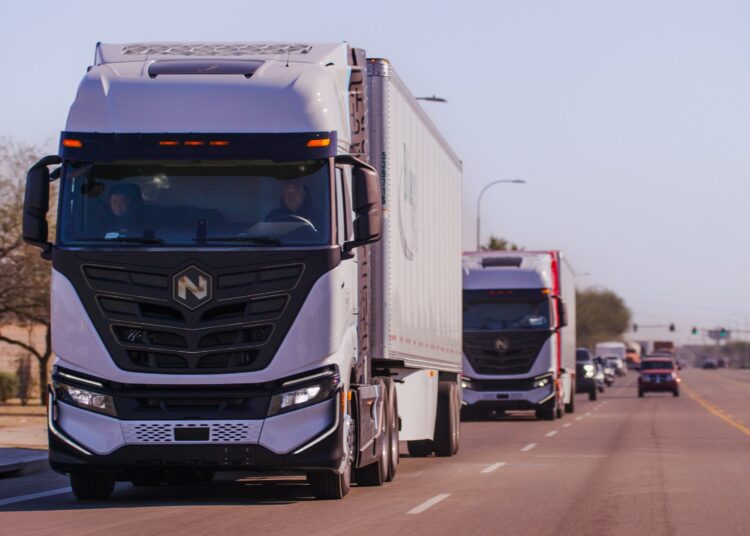Hydrogen-powered fuel cell trucks are the only long-term zero-emissions technology suitable for long-haul trucks, according to a new North American Council for Freight Efficiency (NACFE) study.
“This is something that’s a journey and we’re going to be taking it for a while,” Rick Mihelic, NACFE director of emerging technologies, said in a conference call Tuesday. “You’re going to need some solution to go the long distances. Driving 600 to 700 miles is not going to be possible with battery-electric [trucks] with heavy-duty payloads.”
NACFE analysts spend a lot of time learning about battery-electric trucks. That includes its exhaustive Run on Less programs. Run on Less – Electric looked at a rage of battery-electric trucks in 2022. A similar program studying charging depots for fleets with more than 15 electric trucks begins later this month.
Battery-electric trucks have an early lead over fuel cells
“One of the things we know is that battery-electric [trucks] are here and they’re going to come ahead of fuel cells,” NACFE Executive Director Mike Roeth said.
Slotting between battery and fuel cell power is the adaptation of internal combustion engines to run on hydrogen. Those powertrains create some emissions because they burn fuel. But they represent a low-carbon stopgap on the way to fuel cells.
“We’re quick to admit we did not see that coming when we published our hydrogen study in 2020,” Roeth said.
Cummins leads the way with fuel-agnostic engines
Cummins Inc. is pursuing hydrogen ICE with plans to make it available in a version of its 15-liter engine by 2027. The company said Monday it would spend $452 million to modernize a plant in Jamestown, New York, to make natural gas and hydrogen internal combustion engines.
“You could transition to a hydrogen engine on your way to a hydrogen fuel cell,” Roeth said. “But that’s another step of change in your operations. How much of that can you handle?”
According to Mihelic, hydrogen ICE engines might gain popularity because they are similar to engines fleets use today.
“They still suffer from the same infrastructure issues in that you need to get the hydrogen out there,” he said. “But it may be less of a leap of imagination for fleets to move to a hydrogen engine before they move into fuel cells.”
NACFE’s takeaways on hydrogen
NACFE listed four conclusions to its hydrogen study, updated from 2020:
Hydrogen and battery electric are both needed for a zero-emission freight future. Battery-electric vehicles will be the most economical and efficient choice for shorter distance duty cycles. Hydrogen will be the only viable economic choice for long-haul zero-emission duty cycles.
Hydrogen fuel cell tractors are the only zero-emission solution for many duty cycles for heavy-duty tractors. But costs must fall across the supply and value chain for them to be viable. And government support through incentives are equally important.
Alternative fuels like renewable natural gas, renewable diesel and hydrogen used in internal combustion engines will be required to support a two-decade transition to hydrogen fuel cell electric vehicles.
The transportation industry must choose between gaseous or liquid hydrogen and build out an infrastructure to support that choice. It takes more trucks and trailers to move the same amount of gaseous hydrogen than for liquid hydrogen.
“There’s a lot here that makes it more challenging than battery electric,” Roeth said. “But there’s no way we can avoid it. If you need a zero-emission future, this is where we’re headed.”
Related articles:
Cummins plans $1B+ investment in engine plants, hydrogen equipment
Hydrogen fuel cell maker Hyzon eyes small-scale projects to advance
Run on Less demonstration plugs into electric vehicles
Click for more FreightWaves articles by Alan Adler.
The post NACFE lays out progression to hydrogen fuel cell trucks appeared first on FreightWaves.














